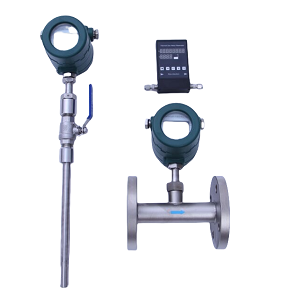Do changes in the composition of the gas affect the thermal mass flow meters (i.e will the flow metering device require recalibration with changes in gas composition)?
Thermal mass flow meters use the principles of heat transfer through convection to calculate the flow rate of a fluid. It is known that the convection rate is affected by the fluid properties. In fact, each fluid has properties that are unique to it and that are why
thermal dispersion mass flow meters are required to calibrate for a particular application. As a result, you should not be using a device calibrated for a natural gas application to be used for an air application, without adjusting the settings that are applicable.
No two gas mixtures are the same. For example, in a high hydrogen gas mix, changes in the hydrogen content will impact the fluid properties to a larger extent than the same variation in natural gas. This is due to the fact that hydrogen has the ability to transfer more heat than other gases. It is not unusual for natural gases to have marginal variations in their composition, even within the period of the device calibration and the actual application. But minor changes like these have minimum effect in gases like methane and ethane, depending on the season. Since most thermal mass flow meter sensors are used to measure the flow rate of natural gas fuels, minor changes like the one mentioned previously might not always require recalibration.
From our experience, most
gas mass flow meters malfunction due to faulty installation. If the gas flow sensor is not installed as per the flow meter manufacturer's instruction manual, the device performance will be affected. In a thermal gas flow meter, this comprises of the depth of insertion probes, a straight run, and alignment of the flow arrow.
Every application of the flow measurement instruments comes with its own challenges and also depends on the user's requirements. Since the requirement for recalibration of the thermal flow meter is application dependent, it cannot be predicted exactly when it is required.
This article addresses common questions about thermal mass flow meters with detailed answers for easy comprehension.
 Flanged Thermal gas mass flow meter with PTFE painting2019/09/13Thermal mass flow meter with PTFE painting is suitable for most gas flow rate measurement, especially suitable for aggressive or caustic gases, such as emission gas,HF gas, ammonia (NH3), H2S, SO2, em...VIEW
Flanged Thermal gas mass flow meter with PTFE painting2019/09/13Thermal mass flow meter with PTFE painting is suitable for most gas flow rate measurement, especially suitable for aggressive or caustic gases, such as emission gas,HF gas, ammonia (NH3), H2S, SO2, em...VIEW Thermal mass flow meter2019/06/14Low cost flow meter for gas and air
Thermal mass flow meter2019/06/14Low cost flow meter for gas and air Thermal mass flow meter for corrosive gas2019/07/18Thermal mass flow meter with PTFE painting probe or ceramic probe is suitable for most gas flow rate measurement, especially suitable for aggressive or caustic gases, such as emission gas,HF gas, ammo...VIEW
Thermal mass flow meter for corrosive gas2019/07/18Thermal mass flow meter with PTFE painting probe or ceramic probe is suitable for most gas flow rate measurement, especially suitable for aggressive or caustic gases, such as emission gas,HF gas, ammo...VIEW Thermal mass flow meter for lab gas2019/08/08SRK-M Micro-flowrate Thermal gas mass flow meter is designed on the basis of thermal dispersion, and adopts method of constant differential temperature to measuring gas flow. It does not require exter...VIEW
Thermal mass flow meter for lab gas2019/08/08SRK-M Micro-flowrate Thermal gas mass flow meter is designed on the basis of thermal dispersion, and adopts method of constant differential temperature to measuring gas flow. It does not require exter...VIEW In-line type thermal dispersion flow meter2019/06/14Gas mass flow measurement.
In-line type thermal dispersion flow meter2019/06/14Gas mass flow measurement. Insertion type thermal mass flow sensor2019/06/14Insertion gas flow sensor and easy install.
Insertion type thermal mass flow sensor2019/06/14Insertion gas flow sensor and easy install.